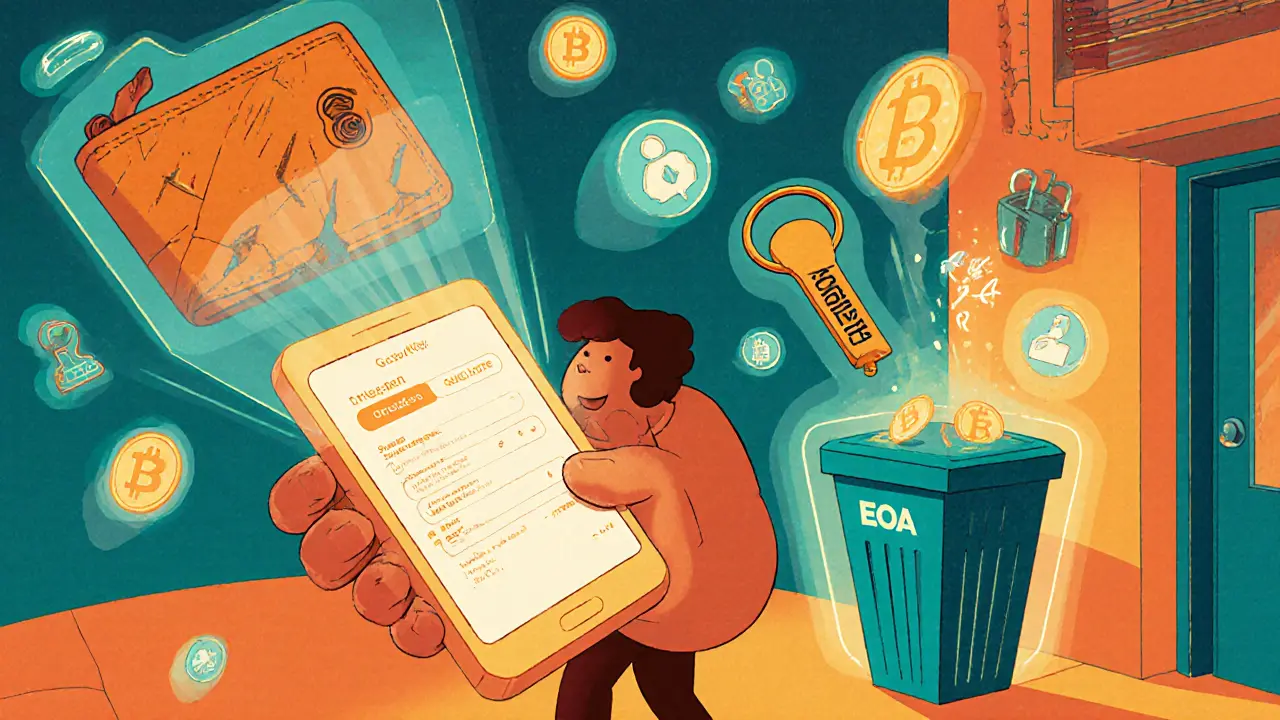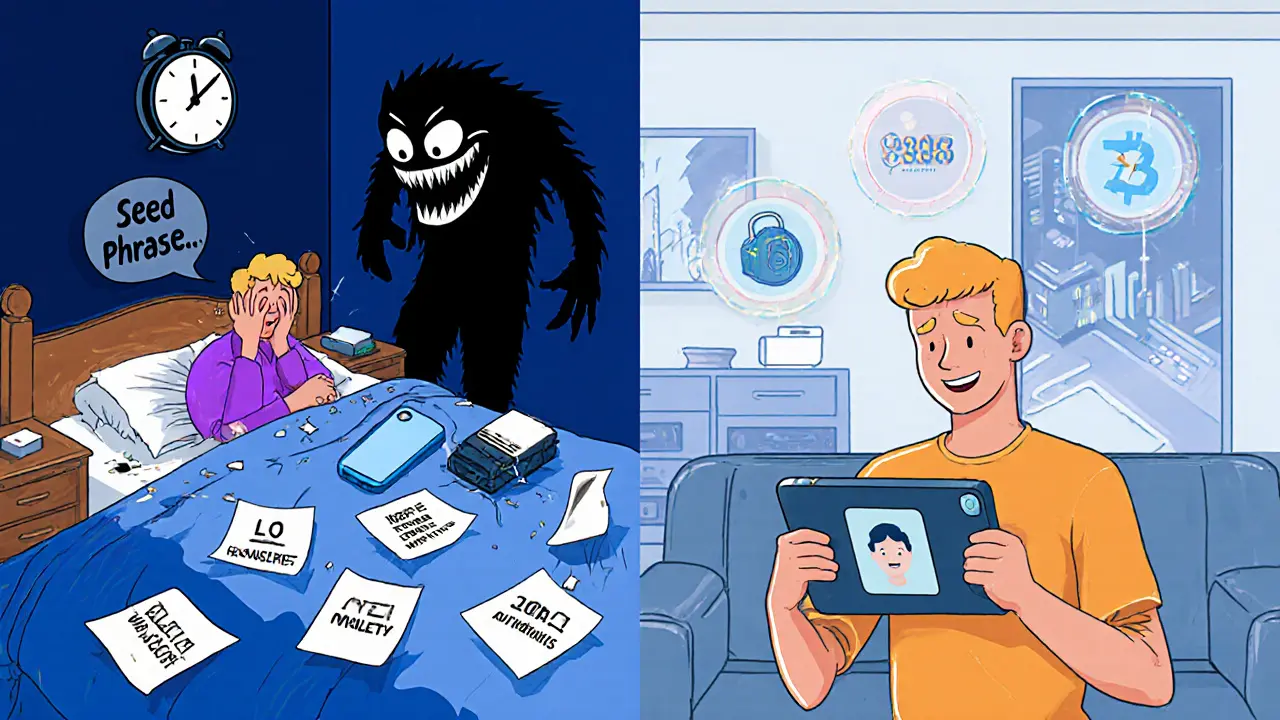Account Abstraction vs Traditional Accounts: The Future of Blockchain Wallets
 Nov, 15 2025
Nov, 15 2025
Gas Fee Estimator with Account Abstraction
Ethereum Transaction Cost Calculator
Transaction Cost Breakdown
Estimated Gas Fee: 0.0015 ETH
Equivalent: $3.75
Imagine sending crypto without holding a private key. No seed phrases. No panic if you lose your phone. No gas tokens sitting idle in your wallet just to pay for a simple NFT purchase. That’s not science fiction-it’s account abstraction, and it’s already changing how people interact with blockchain.
For years, blockchain wallets have worked the same way: you get a private key, you keep it safe, and if you lose it? Goodbye funds. Forever. There’s no reset button. No customer support. No recovery option. This model worked when crypto was for tech insiders, but it’s a dealbreaker for everyone else. Account abstraction fixes that. It doesn’t just tweak the system-it rebuilds it from the ground up.
How Traditional Accounts Work (And Why They’re Broken)
Traditional blockchain accounts are called Externally Owned Accounts, or EOAs. They’re simple by design: a public address linked to a private key. That’s it. No logic. No rules. No flexibility. If you want to send ETH, you sign with your private key. No exceptions.
But here’s the problem: EOAs can’t do anything on their own. They can’t auto-pay bills. They can’t require two people to approve a transaction. They can’t recover if you forget your password. They can’t even pay their own gas fees without you holding native tokens like ETH or MATIC.
Wallets like MetaMask are EOAs under the hood. You think you’re using an app, but you’re really managing a digital key. One wrong click, one phishing link, one lost backup-and your life savings vanish. There’s no safety net. And that’s why most people still don’t use crypto wallets daily. It’s not about price or tech. It’s about fear.
What Is Account Abstraction?
Account abstraction flips the script. Instead of relying on a dumb key, you use a smart contract as your wallet. This isn’t just a wallet with extra features-it’s a wallet that can think. It can decide who can spend, when, and how. It can pay its own gas fees. It can recover itself. It can even let you log in with Google or Apple instead of a 24-word phrase.
The standard that made this real is ERC-4337. Launched on Ethereum in 2023, it didn’t require a hard fork. It worked within the existing system, letting smart contract wallets (called Smart Contract Accounts or SCAs) act like regular accounts-but with superpowers.
Think of it like upgrading from a basic landline to a smartphone. The old phone could only make calls. The new one can video chat, pay bills, lock your doors, and call for help if something goes wrong. That’s the difference.
Key Benefits of Account Abstraction
- Gasless transactions: You don’t need ETH to pay for fees. A dApp or sponsor can cover it. This removes the biggest barrier for new users. Imagine buying an NFT without first buying ETH. That’s now possible.
- Multi-signature by default: Need two people to approve a withdrawal? Done. No extra setup. Just program it into your wallet. Perfect for couples, teams, or businesses.
- Social recovery: Lost your phone? No problem. You can recover your wallet using trusted friends, email, or even a family member’s approval. UniPass Wallet and others already do this.
- Session keys: Want to let a game spend up to 1 ETH over 24 hours? Create a temporary key. No need to give full access. Great for gaming and DeFi.
- Dead man’s switch: If you stop using your wallet for a year, funds auto-transfer to your heir. No legal paperwork. No waiting. Just code.
These aren’t add-ons. They’re built-in. And they’re not theoretical-wallets like Safe, Biconomy, and Argent already use them. People are using them daily.

How Sui and Other Chains Are Doing It Differently
Ethereum’s ERC-4337 is the most popular path, but it’s not the only one. Sui blockchain took a different route. Instead of layering abstraction on top, it built it into the core. Sui’s Move language treats accounts as first-class smart contracts from day one. That means every account can have logic, permissions, and recovery rules built right in.
Sui also uses zkLogin, letting users sign in with Google or Facebook-no crypto keys needed. The system maps your web login to a blockchain identity securely. No seed phrases. No risk of losing keys. Just log in like you would to Netflix.
SKALE Network went another way: zero gas fees. They handle transaction costs internally and allow up to 700 transactions per second. That’s not abstraction in the ERC-4337 sense, but it solves the same problem-making crypto feel fast and free.
Each approach has trade-offs. ERC-4337 is backward compatible and works on Ethereum. Sui is faster and cleaner but a different chain. SKALE is optimized for speed but not as widely adopted. The point? Account abstraction isn’t one solution. It’s a movement.
Why This Matters for Mainstream Adoption
Most people won’t care about smart contracts or signature schemes. They care about one thing: does this feel easy?
Right now, crypto wallets are like using a manual transmission in a world full of automatic cars. Account abstraction is the automatic gearshift. It hides complexity. It removes fear. It lets people focus on what they want to do-buying art, playing games, earning rewards-not managing keys.
That’s why companies like Coinmetro call it “the future of crypto wallets.” It’s not just for degens anymore. It’s for parents, students, small business owners. People who want to use blockchain without becoming cryptographers.
When you can log into your wallet with your email, recover it with your mom’s phone call, and pay for gas without holding ETH-you stop seeing crypto as scary tech. You start seeing it as just another tool. And that’s when adoption explodes.
Challenges and Real-World Limitations
It’s not perfect yet. Most account abstraction wallets still need an EOA to deploy the smart contract wallet in the first place. That’s a temporary step, but it’s still a hurdle. Some users still have to manage a seed phrase once, just to get started.
There’s also fragmentation. Not all dApps support smart contract wallets. Some DeFi protocols still assume you’re using an EOA. That means you might need to bridge funds or use a different wallet for certain apps.
And while recovery is easier, it’s not foolproof. If you give too many people access to your recovery group, you risk someone stealing your wallet. The system works best when you set clear rules: “Only my spouse and lawyer can trigger recovery.”
But these are growing pains. Every major tech shift-mobile payments, cloud storage, even email-had them. The direction is clear: wallets are becoming smarter, safer, and simpler.
What’s Next for Account Abstraction?
The next phase is automation. Imagine your wallet paying your rent in ETH every month. Or automatically staking 10% of your earnings. Or sending a portion of your crypto to charity every time you make a purchase. All programmed in advance. No action needed.
That’s the vision. And it’s coming faster than most think. With zkLogin, sponsored transactions, and cross-chain compatibility on the horizon, the goal is simple: make blockchain feel invisible. You shouldn’t know you’re using it. You should just use it.
By 2026, most new wallets will be smart contract-based. Legacy EOAs will still exist for backward compatibility, but they’ll be the exception-not the rule. The future isn’t about better keys. It’s about better experiences.
Should You Switch?
If you’re holding crypto and not using a smart wallet yet, now’s the time. Try Argent, Safe, or UniPass. Transfer a small amount. Test the recovery flow. Try a gasless swap. See how it feels.
Don’t wait for everyone else to catch up. The people who adopt early won’t just save themselves from key loss-they’ll be the ones building the next wave of apps that make crypto truly useful.
Account abstraction isn’t just an upgrade. It’s the first step toward blockchain becoming part of everyday life-not a niche for techies.